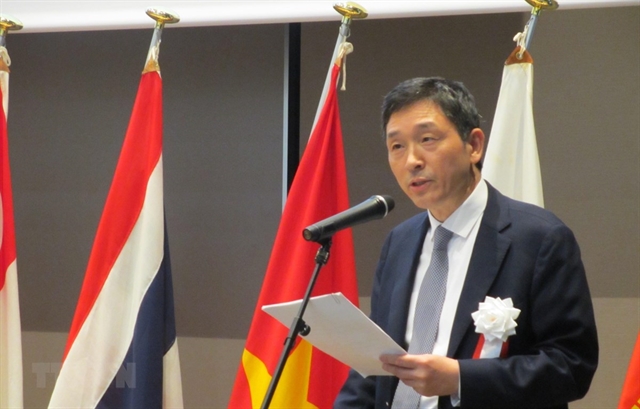.jpg) Opinion
Opinion

Lee Hyuk, General Secretary of the ASEAN-Korea Center, talks to Vietnam News Agency on Việt Nam’s position in ASEAN and relations with the RoK, on the 25th anniversary of Việt Nam’s ASEAN membership.

|
| Secretary General of the ASEAN-Korea Centre Lee Hyuk. — VNA/VNS Photo |
Lee Hyuk, General Secretary of the ASEAN-Korea Center, talks to Vietnam News Agency on Việt Nam’s position in ASEAN and relations with the RoK, on the 25th anniversary of Việt Nam’s ASEAN membership.
How do you assess the development of the ROK-Vietnamese relations so far? What should Việt Nam and the ROK do to further enhance their bilateral ties?
As former Ambassador to Việt Nam, I’d like to take this opportunity to send my heartfelt greetings to the Vietnamese people. My attachment to Việt Nam, its people, and the Việt Nam-Korea relationship has grown even more after I left Việt Nam and became Secretary-General of the ASEAN-Korea Centre.
Undoubtedly, Việt Nam is Korea’s single most important partner among the ASEAN Member States. Bilateral relations between Korea and Việt Nam have thrived over the years in every aspect. Trade volume recorded US$70 billion last year. Korea’s investment to Việt Nam reached $4.5 billion making it the largest investor in the country. Economic exchanges have led to increased interaction among the peoples. Four million Koreans travelled to Việt Nam last year and over 360,000 Koreans and Vietnamese live, study and work in each other’s country. To put this into perspective, exchanges with Việt Nam make up almost 40 per cent of Korea’s exchanges with ASEAN as a whole.
One of the reasons behind the rapid growth of bilateral relations is the frequent interaction among the peoples of Korea and Việt Nam. Unfortunately, people-to-people exchanges and face-to-face interactions have become very difficult with the spread of the coronavirus.
However, both our societies are putting our utmost effort in fighting the virus. We are recognised globally as two of the most successful countries to deal with the pandemic and are much faster in getting back to normal compared to many other nations. The Vietnamese government is now allowing Korean businesspeople to enter Việt Nam, in order to maintain the robust flow of economic exchanges despite the pandemic.
This may be further expanded to create “travel bubbles” between Korea and Việt Nam to allow free movement between low-risk cities. Such efforts will not only help the travel industry, but will also further enhance the close and inseparable partnership between our two countries.
It is predicted that the economic landscape after the COVID-19 pandemic will be quite different from before. We should explore ways to facilitate the cooperation and exchanges among the wide-ranging sectors of the two countries in the post-COVID-19 era.
Việt Nam is the current Chair of ASEAN. What do you think about the role of Việt Nam in leading ASEAN to deal with emerging challenges such as COVID-19?
First of all, I’d like to congratulate Việt Nam for the excellent job done as Chair of ASEAN, in consolidating ASEAN unity and collectively fighting against the coronavirus with the ASEAN member states.
Việt Nam has been working from the beginning of this year to promote a ‘cohesive’ and a ‘responsive’ ASEAN. Việt Nam has stressed the importance of ASEAN solidarity since the outbreak of the coronavirus both to handle the health crisis and restore the economy. Last month, Việt Nam took leadership during the 36th ASEAN Summit where ASEAN leaders affirmed “strong solidarity, political will and determination…to overcome difficulties..[and]…head forward.”
Perhaps, one of the biggest tasks facing ASEAN and the world right now is how to minimise the socio-economic impacts of COVID-19. Communication, coordination and cooperation among countries to minimise disruptions in trade, prevent protectionist measures, and share information is crucial to ensure a quick recovery. Facilitating flow of goods, especially essential goods such as medical supplies and food products across borders will be important to prevent vulnerable countries from economic freefall.
Fortunately, ASEAN has a wealth of experience in working together to successfully overcome crises. Back in 1997, when the region faced the worst financial crisis, ASEAN and the three Northeast Asian countries came together to create the ASEAN+3 cooperative framework. In this regard, I am sure that ASEAN, under Việt Nam ’s leadership, will once again emerge stronger from today’s difficulties.
Việt Nam, having both successfully contained the virus in the early stages of its spread, and as one of the beneficiaries of free and open trade is well positioned to take lead in these efforts—mitigating the spread of the virus, restoring the economy, and enhancing regional competitiveness in the post-coronavirus era.
In this regard, the signing of RCEP under Việt Nam’s Chairmanship will be a significant achievement. Also, Việt Nam’s efforts to strengthen multilateralism in the region through ASEAN-led platforms will contribute to promoting mutual trust and cooperation in the region. VNS